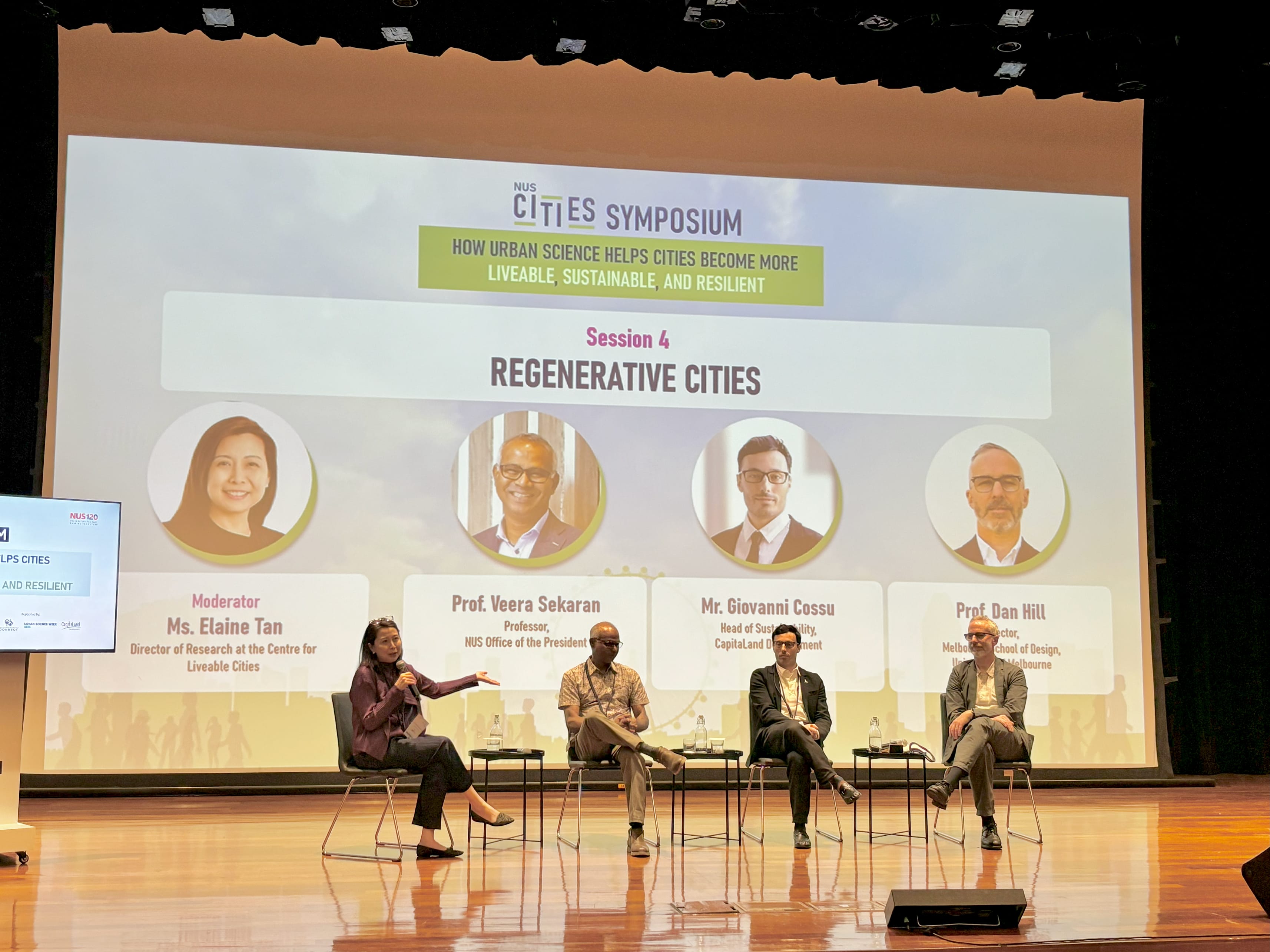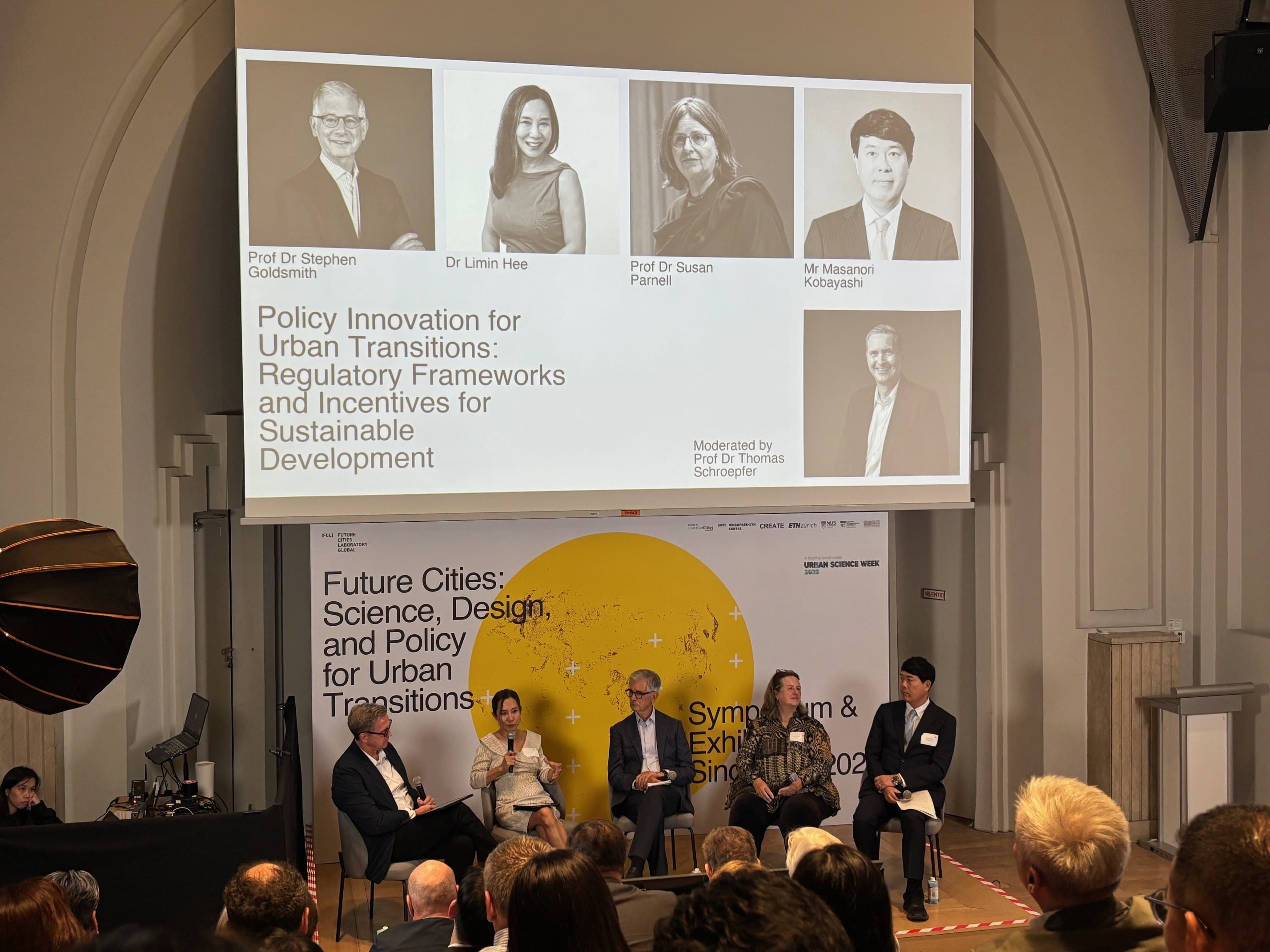Urban Science Week 2025
25 September 2025
Urban Science Week 2025 led discussions on the effective translation of scientific research into practical solutions, with Singapore as both host and living laboratory for integrated urban science solutions.
Highlights from the key events of the week follow:
CLC Lecture – “Shaping Liveable Cities: Capturing the Cross-Domain Benefits of Sustainable Mobility”
The week opened with an examination of mobility planning as a catalyst for broader urban transformation. This session moved beyond traditional transport-focused approaches to explore the impact of mobility projects on interconnected effects on safety, health, carbon emissions, air quality, and social equity. The keynote address was delivered by CLC’s Visiting Fellow, Prof. Dr. Stephen Goldsmith, and he joined Dr Xie Litian, Ray Krishna, and Dr Sergi Sauri in a panel discussion moderated by Professor Dan Hill.
The discussion revealed two fundamental requirements for successful integrated planning. First, establishing a clear, shared narrative must precede technical analysis and data-driven solutions. Without this common understanding, sophisticated technical capabilities will fail to drive meaningful change because stakeholders lack alignment on vision and objectives. Second, effective governance structures prove essential for translating technical capabilities into practical outcomes. The panel discussion highlighted that successful integration requires designated leadership, clear accountability mechanisms, and institutional arrangements that can overcome traditional agency silos and competing priorities.
A joint e-publication between CLC and CENIT on a cross-domain approach to sustainable Mobility was launched at this lecture. It can be downloaded here.
NUS Cities Symposium – “How Urban Science Helps Cities Become More Liveable, Sustainable, and Resilient”

The NUS Cities Symposium featured presentations from leading experts and explored urban science as a framework for addressing city challenges through interdisciplinary research and evidence-based planning, with keynote speeches from Professor. Dr. Stephen Goldsmith, Professor Luis Bettencourt, Professor Alexander Zehnder, and Professor Dan Hill. The symposium was opened by Singapore’s Minister for Health and Coordinating Minister for Social Policies, Ong Ye Kung, who shared on Singapore's transformation over 60 years and her position as a potential global hub for urban science research. He emphasised the need to bridge the research-application gap through collaborative arrangements, and the importance of anchoring technical research to support community values.
The panel discussion revealed three fundamental principles for how urban science advancements may help cities may become more liveable, sustainable, and resilient:
Urban Development Requires Integrated Approaches That Balance Data with Community Engagement. This requires synthesising scientific research, community engagement, and systematic implementation. Speakers argued that successful cities must balance data-driven insights with authentic community participation to ensure urban solutions address genuine human needs rather than imposing purely technical interventions. As Professor Luis Bettencourt explained, cities exist mainly to help people connect with each other, which means urban planning must be coupled with research with genuine understanding of what residents want.
Academic Research Must Be Restructured to Bridge the Translation Gap. A critical challenge identified throughout the symposium was the translation gap between academic research and practical application. Speakers consistently noted that valuable urban science research frequently remains within academic circles rather than becoming operational tools for practitioners and policymakers. This requires institutional restructuring to prioritise impact-oriented collaboration between universities, government agencies, and private sector partners, as demonstrated by Professor Mak Swee Liang's experience in reorganising research frameworks to focus on solution delivery rather than traditional academic outputs.
Sustainable Cities Demand Comprehensive Systemic Transformation. Achieving sustainable and resilient cities demands comprehensive systemic transformation rather than incremental project-based interventions. This involves realigning regulatory frameworks, financial incentives, and professional practices across all urban development sectors to support regenerative outcomes. Speakers highlighted the need to update policy instruments to encourage circular practices, integrate sustainability principles with professional education, and develop performance-based frameworks that reward long-term environmental and social benefits. Critically, the discussions revealed significant gaps in measurement capabilities, with panellists calling for dynamic, context-sensitive metrics that complement established environmental indicators to better capture community wellbeing and neighbourhood social fabric outcomes.
CLC's Director of Research Elaine Tan moderated a session on Regenerative Cities, examining systemic approaches to sustainable urban development. Discussions focused on transitioning towards outcomes and performance-based policies that incentivise circular practices and comprehensive supply chain tracking, whilst embedding regenerative principles in education and professional practice. Panellists identified supply chain fragmentation and lack of industry consensus as key barriers requiring enhanced collaboration. The session highlighted critical gaps in social impact measurement, noting that whilst environmental ESG metrics are well-established, social indicators remain underdeveloped, necessitating dynamic, context-sensitive measures to capture community-level insights.
Future Cities Laboratory – “Future Cities Symposium: Science, Design, and Policy for Urban Transitions”

Organised by the Future Cities Laboratory, the Future Cities Symposium examined research-government collaborations for urban transitions, featuring keynote speeches from Prof. Dr. Susan Parnell, Prof. Dr. Stephen Goldsmith, Mr Masanori Kobayashi, Dr Inhee Kim, Em. Prof. Ir Dirk Sijmons, Mr Leonard Ng, and Dr Vo Trong Nghia. The accompanying exhibition featured partnerships between Future Cities Laboratory, ETH Zurich, and government agencies.
Day 1 examined collaborative governance and policy innovation, focusing on how cities can address complex challenges through cross-sector partnerships. Day 2 presented cutting-edge research across six themes: digital infrastructure for collaborative research, circular development models, integrated urban energy systems, climate-resilient infrastructure, human-centred design, and reimagined food systems – the presentations demonstrated how interdisciplinary collaboration can address sustainability challenges while navigating real-world implementation barriers. The symposium highlighted research institutions' evolving role as crucial intermediaries between global insights and local policy implementation, extending beyond knowledge generation to include adoption as an explicit goal.
CLC's Director of Research, Limin Hee, delivered an opening address emphasising the critical need to bridge research and practice for urban transformation and participated in the panel discussion titled “Bridging Silos: Policy Innovation for Urban Transition”. She highlighted how complex urban challenges—climate resilience, demographic transitions, and technological integration—require cross-domain solutions that transcend traditional sectoral boundaries to optimise liveability outcomes, reiterating CLC's commitment to fostering ecosystems where research and practice continuously inform each other. The panel discussed how research institutions develop communities of practice spanning researchers, public agencies, and private partners, and the value of policy sandboxes serving as confidence-building platforms that enable stakeholders to build evidence before large-scale implementation across different contexts.
Discussions across both days revealed three fundamental shifts needed to transform urban research into practical solutions that improve cities and peoples’ lives:
Research must be designed for real-world implementation from the start. Speakers demonstrated that valuable research often fails to become practical policy because implementation is treated as an afterthought rather than a core research objective. Universities need to take active responsibility for ensuring their work reaches practitioners, treating the adoption process itself as a research discipline rather than simply publishing papers and hoping agencies will figure out how to use them. Successful examples showed research institutions exceeding performance targets and scaling innovations through academic leadership and direct collaboration with implementing agencies, with digital platforms evolving from basic repositories to AI-enhanced knowledge hubs specifically designed for practical use by planners and policymakers. However, multiple presentations noted that maintaining conversations with government agencies does not automatically translate to policy adoption, highlighting the need for more intentional implementation strategies.
Innovation requires new evaluation systems and cross-sector collaboration. A major theme across both days was the mismatch between innovative solutions and existing institutional frameworks. Ground-level practitioners naturally prefer established approaches for safety and reliability, while evaluation committees assess new proposals using tried and tested standards, creating significant barriers for revolutionary solutions despite their clear benefits. Sustainable construction innovations that could dramatically reduce emissions struggle with industry acceptance despite public support, whilst energy integration systems that could significantly reduce storage needs face implementation challenges because they blur traditional boundaries between sectors, creating uncertainty over procedures and responsibilities. Climate resilience technologies and circular economy approaches encounter similar barriers where existing regulatory frameworks weren't designed to accommodate breakthrough innovations. The solution involves developing new evaluation frameworks alongside innovative proposals, creating regulatory sandboxes for testing, and building governance models that support inter-agency collaboration.
Effective urban planning must balance advanced technology with human-centred design. Despite extensive discussion of artificial intelligence, digital twins, and advanced analytics across both days, speakers consistently emphasised that successful urban development must remain centred on human needs and community engagement. Urbanism was highlighted as an "incomplete science" where quantitative analysis cannot capture the full range of human experiences that make cities work, with research reinforcing this through human-centric design approaches that integrate computational tools with qualitative user experience research. Large-scale data analysis projects emphasised that urban vitality perceptions are highly context-specific and require continuous community feedback mechanisms, whilst climate resilience and mobility planning systems developed sophisticated AI capabilities but required human expertise for interpreting results and ensuring contextual relevance. Food system and territorial planning research demonstrated how technical solutions must account for local knowledge and community needs to be effective. Speakers concluded that planners must "be human before being an engineer," using technological capabilities to enhance rather than replace human-centred design principles.
Conclusion
Urban Science Week 2025 demonstrated that the future of cities depends on successfully integrating scientific rigour with human-centred approaches within collaborative frameworks that bridge research and practice. Across the week, participants from government, academia, and industry shared a common understanding - transforming cities requires fundamental changes in how we conduct research, evaluate innovations, and implement solutions.
Discussions revealed that effective urban transformation begins with establishing shared narratives and clear governance structures before deploying technical solutions. Whether addressing mobility planning, sustainability transitions, or climate resilience, successful initiatives consistently combined data-driven insights with authentic community engagement, ensuring that sophisticated analytical capabilities serve genuine human needs rather than imposing purely technical fixes.
Most significantly, the events highlighted the urgent need to restructure academic institutions and evaluation systems to prioritise real-world impact. Universities must evolve beyond traditional publishing models to take active responsibility for ensuring their research reaches practitioners, whilst regulatory frameworks need updating to accommodate breakthrough innovations through policy sandboxes and cross-sector collaboration mechanisms.
The discussions also emphasised that achieving sustainable cities demands comprehensive systemic transformation rather than incremental interventions. This involves realigning regulatory frameworks, financial incentives, and professional practices to support regenerative outcomes, whilst developing dynamic metrics that capture community wellbeing alongside environmental indicators.
The week insights offer a roadmap for cities globally – when research institutions, government agencies, and communities work together with shared purpose, cities can become more liveable, sustainable, and resilient. The challenge now lies in scaling these collaborative models to meet urgent urban challenges through evidence-based, community-informed solutions.
Contributed by Dr Michelle Cheam, Assistant Director, Research
